|
First Six Believers Baptized The Adoption of Our Son Thomas Planning for Furlough |
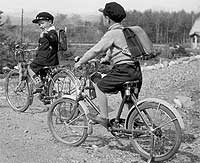 Gene & Louella with their congregation in Taikai |
On the opening day of school we took Philip to the Opening Day activities and ceremonies. There were one-hundred and fifty first-graders in three different classes, with fifty in each class. We did have some thoughts and concerns about putting our little pale-faced child among all the other children in school. There were only eight-hundred and twenty students in the elementary school, and all of them wanted to see this foreign child among them. It was very awesome to say the least!
On the first Sunday evening we gathered in our living room for services, and we had twelve guests present. Now we were on our own with Japanese young people, and Mr. Kondo, who came with us as my helper from Obihiro, there for to help in translating. He seemed really happy to do anything we asked of him, and he would serve as a leader at most of our church services. His help was very necessary, for often he would explain things that I was trying to say in my imperfect Japanese language. We also had some neighbors move into other rooms of the old hospital that we were not using, and we were happy to have some Japanese folks living nearby. Sometimes, we needed to ask questions about customs that we did not understand, and they were able to help us out quite often.
Later on, we wanted to build a house, so we purchased some land on the other side of the river that divided our town. Carl Beck came from Obihiro with the Mission Seal that was used to finalize the purchase of the land, and it did not take long to purchase the land once the decision was made to do so, and everyone was happy with the deal.
Then, we had to purchase the lumber for the building. Also, it was necessary to purchase cement blocks for the walls of the house. I had worked with several Japanese blueprints, so I was able to draw up plans that the Japanese could understand. I drew up plans for the house as we wanted it built, and the contractor had blueprints made, with copies for the city office, the carpenters, and for us. The Japanese are really serious about details, and they want to know every detail before they begin a project.
As the summer progressed, our Sunday evening meetings were attracting twenty-some people who showed much interest and asked good questions. We were very much encouraged. We also noticed that as Philip progressed in school, and talked about different things, that his thinking was becoming more and more Japanese. What would this mean in years to come?
As the days passed and April came, we thought that Spring should become more evident, but the winds were blowing off the snow mountains to the west, and they were so very chilly and cold. Sometimes, the wind became so strong that it was difficult to work outside. There were some days when the men working on the house had to quit working because of the force of the wind.
On May 27 my good helper, Mr. Kondo, unloaded a heavy burden that he had on his heart for a long time. He had made many friends in Taiki, but not all of them thought the same as Christians do, so their influence was not the best. Being a lone Christian among many other people in restaurants and public places, the attitudes of other people toward Christians had almost overwhelmed him. He had become quite absorbed in thinking of a Japanese leader, a University professor, who, as a Christian, had started what came to be known as the Non-Church Movement. Professor Uchimura, as this man had been called, had become disillusioned with the church, and he felt that the established church was not adequately fulfilling the purpose of Christ in the world. Many University students became followers of his, and he expressed an equal love for both Jesus Christ and for Japan, but his love for Japan was a patriotic love. His love for Jesus put him at odds with his own countrymen, and his love for Japan put him at odds with missionaries, and with the organized church, who thought that he was too narrow. On the other hand, he felt the organized church controlled peoples lives too much with their organization. Mr. Kondo, my helper, had a lot of respect for Professor Uchimura, he found that some of his friends were critical of the missionaries. He and I had many talks together, but what he was hearing from his own people appealed more to his heart.
Brother Kondo struggled with his thoughts for quite a while, but he finally decided that he could not continue with us. He left with the understanding that he would be going to the University of Tokyo in the autumn, but somehow this did not happen. We completely lost track of him. We did hear of him years later, but, unfortunately, we never had the opportunity to meet him again.
During the summer of 1956 we continued to experience many winds coming down from the cold Hidaka mountain range to our west. That cold air from on top of the mountains seemed determined to get down beneath the sun-warmed air in our area, hence the cold winds came steadily from the mountains. The fact that we needed to be building a house often put a strain on us as we worked with the Sisters and Brothers seeking to become a part of the church. Then, their friends would try to discourage them in their walk of faith because they did not agree with the Christians and their activity among their people. These influences drove us to greater diligence in prayer, and during that time we received some much needed help from another source.
An elder Brother from the Kushiro church came occasionally, and he brought us a message in Japanese that the people we were trying to reach could more readily understand. This, we all appreciated very much. He was also a great help to Louella and I, as he could explain to us Japanese customs that often perplexed us. One thing that we had not previously understood was when new converts would not want to invite their parents to their baptismal services. We thought that this would be such a wonderful time to give their parents a better understanding of the Christian ways. However, this incredibly helpful individual explained that the parents often opposed their children from becoming members of the church, but if the children went ahead and were baptized, then the parents would no longer oppose them. Instead, they would simply realize they could now do nothing about the situation. That sure helped us to understand the thinking of the young people, and why they hesitated to invite their parents and siblings to their baptisms.
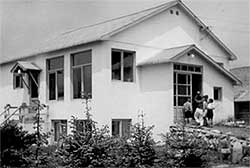 The Blosser's new home in Taiki |
After the traditional Summer Camp happened as usual, we moved into our new, unfinished, house on August the 17th. Soon following our move, we planned a dedication service. In this service, we presented ourselves, as a family, to the Lord, and vowed to fulfill His purposes, that we might do His Will and serve His church. It was a meaningful experience for us all, and we invited some people from other churches to come and share with us in the experience.
This year at Christmas we had the usual rush of activity and practicing for the Christmas programs just like we had experienced in previous years. We had a candle-lighting service on Christmas Eve, and there was an excellent turn out. That same evening, Miss Yamayoshi, whose home was out in the country, a short distance from Taiki, took the opportunity to announce that she would be getting married soon. We found out later that, unfortunately, she was marrying an unbelieving husband. The difficulty is that there are so few Christians in Japan, it is nearly impossible to find believing companions in every community for every Christian who wants to marry. This was disappointing for, even then, we knew of the problems that are bound to arise in such a relationship.
Our big event of the year came on New Year's Eve. Miss Nakazaki had been a very faithful attendant at all of the meetings we had in Taiki, both previous to our moving there, and following our move to Taiki. She had proven herself to be a very dependable person. Late on New Year's Eve, she wrote a letter to us. She told in some detail the long struggle she had experienced while determining whether she should become a Christian or not. She knew that her mother was a very faithful and active Buddhist, and her mother worked daily to promote the faith of Buddhism. Miss Nakazaki also was aware that she may have difficulty relating to the rest of her family if she were to become a believer in Jesus Christ. We knew what it was like to be an outsider in Japan, and for her to be in such a predicament with her immediate family held a very strong probability. We could feel much of what she was feeling, and we understood. She was so perplexed with her problem that she had contemplated suicide. That was, sadly, a very common Japanese reaction to a dilemma like the one she was experiencing.
On this New Year's Eve she began to pray. As she opened her heart to the Lord, she began to feel His presence. As she prayed, she offered herself to Him in a commitment of faithfulness. At that moment, a wave of love, joy, peace, and confidence poured over her and filled her soul. She felt so much joy in her heart that she could hardly contain it. So, she wrote the letter to let us know of her experience with the Lord. We shared the letter with our pastor, Mr. Chiba. We were so filled with joy to think of the first of our confessed converts in Taiki. All the months of teaching, praying, and hoping in the Lord were well rewarded. Oh, the joy of it all! We could hardly keep from flying!
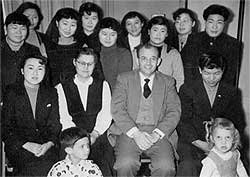 Gene & Louella with their congregation in Taikai |
In February, our Taiki believers were studying the Gospel of John together. As we were studying John, we challenged people in the group to seek God's New Birth by which Jesus opened the door for us to come into fellowship with Him. There were four persons who confessed faith and said they would like to prepare for baptism, and another one or two were still struggling with the decision. One Sunday evening after worship they all stayed to talk, and they avidly gave testimonies when others asked questions. This was getting exciting! They talked until 11:30 that evening.
A few nights later, more confessed faith. Now, there were six souls who had confessed that they believed in Jesus as their Savior. What joy followed as we were able to share with them a mutual faith in the Lord, and were able to rejoice together in the goodness of the Lord.
It was just then reported to us that Mrs. Mitsuka who had helped us in Obihiro had been baptized thirty-nine years before, but that for many years her faith had been sleeping. Now, she has expressed a desire to reconsecrate her life to the Lord Jesus, and she had become a part if His church again. We praise the Lord for working in her heart, giving her a desire to walk again in faith with Him.
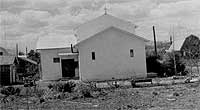 The Church in Taiki |
Another event this winter had proven to be a tremendous blessing to us, and to the believers at our church. Don Reber had started a Christian radio broadcast from Sapporo with a very gifted Japanese evangelist as a speaker. He had also advertised a correspondence course for listeners who wished to study their Bibles at home. Don wrote me a letter telling me about a high school student from Hiroo, on the coast, about thirty minutes south of us by train, who was studying the correspondence course. He was actually in the T.B. hospital there, had time on his hands, and was learning with some determination. Don asked me if I would visit him, and I responded that I would gladly do so. One day, I went to see him, and found a very fine young man in him. He also was keeping up with his peers in high school by studying a correspondence course for that too. He was certainly a very gifted person, as well as ambitious, and we were very excited to know that there was such a person living in Hiroo.
Two weeks later, I visited him again. He seemed glad to see me, and responded warmly when I suggested that we read a Scripture together. After discussing it some, I sensed that he had a very good understanding of the Gospel. I asked him if he would like to receive Jesus as his Savior, and he responded in the affirmative. So, I explained to him how we do this, and I asked him to pray with me. He did, and we prayed that the Lord would come into his heart and help him to be a faithful follower of His. I continued to visit him about twice a month, and we enjoyed some wonderful times together.
It was early in April of 1957, and the six we had in our first seekers class said that they wanted to be baptized. This, as I mentioned earlier, was a hard decision for the Japanese to make, so we were approaching the date for the first baptism with some uneasiness. Our uneasiness was not nearly as great as it was for the others, never the less, we had ours also because we were aware that they were having some real struggles. As the day drew nearer, it was evident that they were having problems with their commitment, but we continued to pray for them that their faith would be strong. We had our church meetings on Sunday evenings because many of them worked during the day, and they could not get off to come in the morning.
Our services began at 7:30 P.M., and as the hour came nearer, it seemed that Louella and I were both very tense. Carl Beck came to speak that evening at our meeting, so he was there, and one or two people came, and we waited. Soon, 7:30 came, but the ones to be baptized were not there yet. Would they all stay away? Would they not go through with their promise? At a little past 7:30 a couple of them came, and we welcomed them. Then, a couple more came. We continued to delay the opening of the meeting. Then, another came. Finally, and about twenty minutes late, the last one came. How grateful we were! The last two that came asked, "Are we too late?" We replied, "No, we haven't started our meeting yet." We then began the meeting, and true joy filled our hearts.
The meeting went well, and Carl brought us a good message on "Living The Christian Life." Then, time came for the Baptism Ceremony. It went well, and they all confessed their faith in the Lord and promised to be faithful followers of Jesus. I baptized them, and their response was good. After the meeting, they all seemed to be really happy and rejoicing in their new found faith in Jesus.
I am sure that in the days ahead their faith was tested in ways we never guessed, in ways that they had never expected, but they continued to walk by faith. They continued to grow and to learn how to stand up to the evil one and his temptations. They would come with many questions, and some were not easy to answer, but we would find answers in the Bible that they could trust. Their trust in the Word became increasingly strong and stable, and it was a joy to see their faith grow.
In late July we planned and held a short evangelistic meeting of several days. Twenty-one people signed cards expressing interest in studying the Bible, and some were interested in becoming Christians. There were actually fourteen who decided to attend seekers class, and we were greatly encouraged.
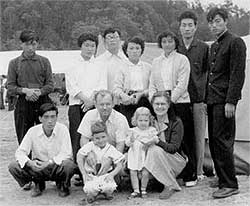 Taiki group at Camp. |
Another thing that we were able to begin in Taiki was a broadcast of our Mennonite Hour tape. In Taiki, as in many rural villages in Japan, they have telephone-like connections to farmers' dwellings by which contact can be made at any time, and these are left turned on constantly. During the day-time and evening hours, they broadcast news, play music, and make known any kind of emergency. And, using these connections, we were able to broadcast our Mennonite Hour tape to the farmers. This was at a given time each week, and I was able to take my tape recorder, which was a good one, and play the tape for the broadcast.
In early August of 1957 we again held Summer Camp for all our churches in Hokkaido. Our speaker that year was Pastor Horikawa, who was a very gifted speaker. About eighty young people were present for camp, and the spirit and cooperation of everyone was very good, and our camp proved to be a really blessed experience for all who were there.
During the spring and summer of 1958 Philip talked much about how nice it would be to have a brother "just the size of me." He seemed to think and dream about it continually. There were many people at that time who were adopting children in the U.S., and there were articles in the Church papers telling about the experiences of those adopting. Letters from friends also brought word about these adoptions. We, of course, talked about the things we were reading, and Philip was listening! One day, he asked, "Couldn't we adopt a child like others do in America?" He continued, "We aren't rich, but don't we have enough that we could have another child in our family?" Louella responded, "Maybe God will give us another child." Philip said, "Yes, but it would be a little baby, and probably a girl!" His prodding and continuous talking about it caused us to think and pray more seriously about the matter.
In September of that year Louella went to Tokyo to attend an International Conference on Christian education in the church, where was able to gather considerable information about the work of Christian education from other educators that would be useful in planning the future of our church. While in Tokyo, Louella talked one day to a person from the Evangelical Alliance Mission about whether or not they had any six or seven-year-old boys at their orphanage. She was not sure since their orphanage was some distance from Tokyo, and she did not get there that often. So, when Louella was ready to leave Tokyo for Hokkaido, she said to her friend of the Alliance Mission, "If you find a little six or seven-year-old Japanese boy who needs a home, give us a call." From there, Louella put the whole thing out of her mind. However, she did tell me what she had done, but not in the presence of Philip.
It was about two weeks later when a call came from her friend in Tokyo saying, "There is a little six-year-old boy at Muroran City, on the Island of Hokkaido," and she gave us the name of the missionaries there whom we could contact if we were interested. We knew the Missionaries very well, having met them at the All Hokkaido Missionary fellowship that met once a year. Now, was this really the Lord leading us? Usually, one has time to prepare for another member of the family, and this seemed so sudden! We corresponded with the missionaries whose names they had given us, and they responded quickly to our letter, sending pictures of the boy whose name was "Yoshiro." Philip was the most excited about the possibilities, and had to work at keeping his hopes realistic. The missionaries said that if we came to see Yoshiro, then we should plan to stay at one of their houses, and that they would make plans to meet the family. We wrote them and gave them a date when we would like to meet and talk with the family, and the day finally came which we had designated in October. We left our children with friends, and took the train to Muroran, which took most of a day. We arrived in early evening, and were warmly welcomed by our missionary friends. Plans were made for us to meet the family the next morning at the uncle's house, and we learned that Yoshiro and his family had been forsaken by the father when Yoshiro was still an infant. His Mother left home when he was about two and one-half years old. He said that he recalled the morning she left. Apparently, she got up early, thinking that Yoshiro would still be sleeping. She put quite a few things that she wanted to take with her in a "Furoshiki," (a large square piece of cloth used for carrying things on one' s back) and lifting these things to her back, she walked out the door and past the window of the room where Yoshiro was lying. He never saw her again.
Yoshiro's grandmother had become the caretaker of Yoshiro and his older brother and sister. As the grandmother became older, however, she was no longer able to care for herself and the three children. At the uncle's house, we learned that the uncle had three children of his own. So, with the six children, plus the grandmother, his wife, and himself, they were a family of nine. They were discovering that his salary of thirty-thousand Yen a month was not enough to provide for this sizable family, and they were at the point of a serious impasse. Yoshiro, up to this point, had not been in school, and he was being passed around from one place to the other. Now, however he was now in school, and this was no longer, so they were looking at the possibility of adopting him out.
We told the grandmother and uncle that we were interested in taking Yoshiro, but that we wanted to check with his teacher to see how school was going. We also said that we would like to take him with the understanding that if he or us found the situation too difficult for him to be in a foreign home, that we might return him to them. They agreed that this would be acceptable. We then contacted his teacher and had a good talk with her. We discovered that she was a Christian who had been praying for Yoshiro, and that she was deeply concerned for him and his future. She also indicated that, even in the unstable situation, Yoshiro was doing average work.
We contacted the family later that day and told them that we would like to take Yoshiro with us on the following day. We asked if they could bring him to the station the next morning at a little before train time, and they agreed to be there with him. That night, we stayed again with our missionary friends. They were so interested in our plans about taking Yoshiro with us, and we shared the plans that we had made with the family. They prayed with us, that the Lord would lead in all our plans and decisions.
The next morning, we were up early, ready to face the day and what it would bring forth. We found the Yoshiro and his family waiting for us at the train station. They had Yoshiro cleaned up and dressed in the best that they had for him, and he carried a little suitcase, not much larger than a lady's handbag, containing a few clothes and some other things that he might be able to use. The Grandmother came not only to see us off, but to get on the train and ride with us for about an hour, and then take a return train. As we rode along on the train she gave Yoshiro some good grandmotherly advice about living a good life, becoming a good man, and being a dependable person. As we talked with her, she mentioned things that Yoshiro had said and done that she thought were significant or cute. When the train stopped at Tomakomai, where she intended to get off, she stood up and bowed deeply to Yoshiro, a sign of respect and great appreciation for his life. She said a few last words to him, then turned, walked out, and never looked back. It seemed a bit harsh to us, but at the same time, her going with us that distance was a significant gesture that showed how she had deeply appreciated his life, and this was how she had expressed what he meant to her. We had been in Japan long enough to no longer questioned whether their ways or ours were better. To all each and everyone, the familiar usually seems better.
After the grandmother got off the train, we traveled on for many hours. It seemed that every fifteen or twenty minutes, Yoshiro would ask, "Are we about there?" And, we would have to tell him there are many more hours to travel. After many hours, we did change from the train to a bus, which took us around the southern point of Hokkaido, and up the "Gold Coast Road," so called because of the great expense of keeping up such a road that ran between the mountains and the ocean. The waves were constantly pounding the coast, unmerciful to the road, and it cost much to keep it up.
We talked about many things with Yoshiro as we traveled along, asking him about his life with his uncle, what he did every day, how he liked school, and what studies he liked. He did not seem to have any hesitation to talk to us about anything. After several hours on the bus, we finally arrived at Hiroo where we would get the train for another thirty minute ride to Taiki. Kita San, our helper, was at the station to meet us. She had Rachel with her, seated on the back of her bike. When Rachel saw that we had Yoshiro with us, she would not look at him again or say a word. Soon, Philip and his friends came running, and we introduced Yoshiro to them and his new brother. They recognized each other, but said little on the way home, which was about a five minute walk. But, when we got home, they soon found things to talk about, the words began to fly, and it seemed like they almost never stopped. It took he and Rachel longer to get to know each other, and that is understandable. The first thing he said about Rachel was, "This is the first time I ever saw a living doll." He soon, however, learned that she was a living person, and not so different as he had earlier thought.
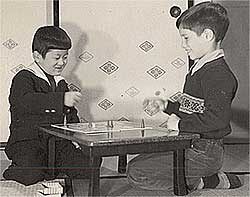 Tom and Philip playing a game in the Blosser home in Takai. |
Philip and Yoshiro seemed to get along very well for a while, but soon there were some differences between them. For Philip, the adjustments were more difficult than he thought they would be. It was difficult for Philip because previously he did not have to share his toys with another boy. For Yoshiro, our house was a wonderful place to live with many things to play with, compared to where he had come from. When the Japanese could afford toys, there were many to play with, but for many at that time, there just was not money to buy so many. We really had some serious questions about whether it was good or bad for him to have so many things with which to play.
After Yoshiro was with us for about one month, he began to react to some of the things in our life and way of living that were really hard for him to accept. He began to tire of the American type of food that our family enjoyed, as well as our American ways of doing things. Suddenly, life seemed to have become a real trial. We began eating more rice so as to ease his dislike for American foods, and he began adjusting to our ways of doing things a little more readily. Anyway, by the time our three months were finished, we, along with him, decided that we needed each other very much. When we asked Philip whether he wanted Yoshiro to stay or not, he said that sometimes it was difficult, but he really wanted him to stay. When we asked Rachel, she said, "We prayed that God would give us a brother, and I think we better keep him." She always seemed to be so laid-back, and to have things figured out so well.
Then, with the decision made that there was going to be no turning back, we needed to think about a name that might make him feel a little more comfortable when we would be in America after about six months. We all talked about it together, about different names we might use, but, finally, all seemed to think that Thomas would be a good name for him. He seemed to also think that Thomas would be good. So, we called him Thomas, adding Yoshiro as his middle name, and his name could be shortened to "Tom" or "Tommy," which would be easy for the Japanese to say. That name was also used on his documents as we prepared to return to the U.S.
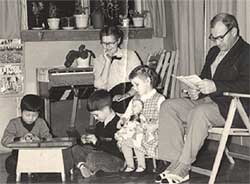 The Blosser Family at home in Taiki, Hokkaido about 1958 or '59. |
That year, we had another family member's birthday to celebrate on November 3rd, Tommy's seventh birthday. Louella made him a cake, and we got a couple of toys for him so that he would have some that were his own. He was rather overwhelmed with such a celebration, as things had been quite meager in his life earlier, and it was hard for us to keep things in what might be considered proper balance for him in his experience.
We always had family worship together in English, but after Tommy came, we switched to Japanese since Rachel and Philip were conversant like Tommy. Also, our speaking at home became almost totally Japanese (except when Dad and Mom's strange accent marred the conversation!).
The holidays that we celebrated at church and at Sunday School, like Thanksgiving and Christmas, were times of great excitement for Tommy. With our times of worship at home, he was learning the real meaning of these celebrations, perhaps faster than some of the children at church who were exposed to the teaching only once a week.
When preparing to go on a furlough, one needs to make plans for the needs of the church. Actually, our first concern was the church, and this was where the Lord stepped in and helped in ways we could not have imagined. It was just a little over a year (maybe two years) earlier that Taiki city office had asked Mr. Takahashi to come to Taiki and teach the children the use of the Abacus. This was to be an after school effort, but they had promised him that the income would be good. So, he moved to Taiki to teach the children as was requested. Also, he became a part of the church. He had asked me to teach him about the church and its significance and functions, and I agreed to do this, not realizing that I was, in fact, preparing him to follow me as pastor. God works through the seemingly natural moving of people to the place where they are needed. In this way, God is actually carrying out His promise that He will build His Church. He really does build it, and he uses us in many ways in the process.
Mr. Takahashi began his teaching in the upstairs space of a book store where he rented rooms for teaching and for his own living space. This shows the versatile nature of the Japanese houses--you can have a room in your home enlarged simply by removing a few sliding doors and storing them in a corner or a closet. It works great! All he needed for furnishings were some small, low tables that the children could kneel behind to do their work. They sat on cushions on the floor, so no chairs were needed. In true Japanese style, he was able to begin classes with a minimum amount of both space and furnishings.
After World War II, the Japanese people were so very poor that they learned to live and work in very small spaces, in fact, so small that most of us would have considered it impossible. Brother Takahashi established himself in Taiki as a responsible citizen and a very capable teacher for the children. He was also studying to make himself a capable student of the Bible. As our time for leaving drew near, in counseling with the other missionaries to determine how we should provide leadership for the Taiki Church, they all felt that he would be the best candidate for the task. I found it very difficult to ask him to do it because he was so young and so recent a convert to the Christian faith. When I asked him if he would consider serving as the leader of the church in Taiki, he said that if he could call on the missionaries from other churches to come and help at special times, he would. We promised to pray much for him and the church, and assured him of our confidence that he would do well. The Lord had been so helpful in providing for us in times of need, so we believed that he would also discover the Lord's faithfulness.
Bro. Takahashi and his mother from Hiroo said that they would be glad to move into our house, care for it in our absence, and continue using it as a meeting place for the church. This was a good solution to the problem of what to do with our house which was mission property.
Our newly adopted son, Tommy, was making good adjustments in our family. We were finding him an easy person to live with, and enjoying him much as a part of our family. We were concerned about him arriving in America, and being unable to understand any English at all, which would be cause for a lot of frustration and adjustment problems. So, we found a child's book with pictures and names of objects, and we used this book to teach him the names of things their meanings. We also taught him some verbs and how they are used in sentences. By the time we arrived in the U. S., he had a vocabulary of four or five hundred words, and he knew a little bit about using them in sentences.
Thomas was also learning about Jesus, God, and the Holy Spirit in our home and in Sunday School. He was also learning about heaven. In Japan, when talking about countries of the world, they say the name of the country, then add "country," as in "Japan-Country" and "America-Country." Heaven might be referred to as "Heaven-Country." One day, Tommy asked, "When we go to America-Country can we stop off at Heaven-Country, too?" It all sounded very logical to him! There were so many questions coming from Tommy, because his world had expanded so much in the last year. After arriving in the U.S., the questions came even faster, and this kept our days very interesting.